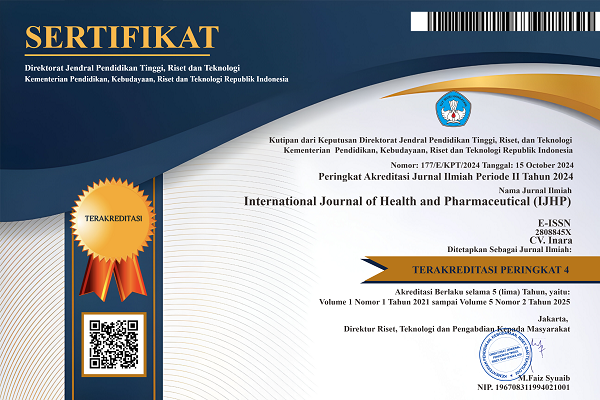The Effectiveness Of The Combination Of Acupressure Therapy With Oxytocin Massage Against The Length Of Time Of Milk Production In Puerperal Mothers
DOI:
https://doi.org/10.51601/ijhp.v3i3.205Keywords:
Acupressure Therapy, Oxytocin Massage and Postpartum Mother.Abstract
According to the UNICEF report, there were 54 neonatal infant deaths per 1,000 live births worldwide in 2020. The highest neonatal mortality rate in 2020 was found in the Sub-Saharan Africa region, namely 27 deaths per 1,000 live births. In Indonesia, only 1 out of 2 babies under 6 months is exclusively breastfed, and only a little more than 5% of children are still getting breast milk at 23 months of age. Nationally, the coverage of babies receiving exclusive breastfeeding in 2019 is 67.74%. The inhibiting factor in breastfeeding is the production of breast milk which is less and slow to come out which can cause the mother not to give her baby enough. A method that is rarely used to speed up milk release and stimulate milk productivity is a combination of acupressure therapy and oxytocin massage. Knowing the effectiveness of the combination of acupressure therapy with oxytocin massage on the length of time to express breast milk in postpartum mothers. Quasi experimental with posttest only control group design. The sample in this study were all postpartum mothers at BPM. Indah Susilowati in August-October 2022 as many as 30 people, the sampling technique is total sampling. The average time for breastfeeding in the intervention group was 2.16 hours and in the control group 2.79 hours. There is the effectiveness of the combination of acupressure therapy with oxytocin massage on the length of time for expressing milk in postpartum women with a p value of 0.000. There is an effective combination of acupressure therapy with oxytocin massage on the length of time to express breast milk in postpartum mothers. The combination of acupressure therapy and oxytocin massage can be considered as an alternative effort to accelerate breastfeeding in postpartum mothers.
Downloads
References
Eka Riyanti, (2019). Effectiveness of Oxytocin Massage on Breast milk Production in Post Partum SC Primipara Mothers at PKU Muhammadiyah Gombong Hospital. The 10th University Research Colloqium 2019 Muhammadiyah Gombong College of Health Sciences
Kartika C, Widyawati, Attamimi A. (2018). Difference in Spending TimeBreast milk between Post Partum
Mother Normal Childbirth and Sectio Childbirthcaesarea with Initiated Regional Anesthesia Early Feeding.Univ
Gadjah Mada.
Ministry of Health RI. (2020). Coverage of babies getting exclusive breastfeeding in 2019. Ministry of Health of
the Republic of Indonesia : Jakarta
, (2019) INFODATIN. Data and Information Center of the Ministry of Health of the Republic of Indonesia. Jakarta: Ministry of Health of the Republic of Indonesia.
Khabibah, et al. (2019). Effect of Acupressure Therapy and Oxytocin Massage on Increasing Breast Milk Production in Postpartum Mothers at Jombang Regional Hospital. Journal of Edunursing.
Mardiyaningsih, E. a. al (2017) 'Effectiveness of the Combination of Marmet Technique and Oxytocin Massage
on Breast milk Production', FIK Universitas Indonesia, Jakarta.
Mukhoirotin, Khusniyah, Z. and Susanti, L. (2018) 'The Relationship of Maternal Knowledge about Exclusive
Breastfeeding with Exclusive Breastfeeding Behavior in BPM Hj. Umi Salamah Peterongan Jombang', Journal
of Edu Health, 5(2), pp. 94–101
Novidiyawati, (2022). Fectivity of combination of acupressure therapy with oxytocin massage against the length
of time of milk production in puerperal mothers. Scientific Journal of Nursing Special Edition, Vol 8, No. 3,
Rahayu, et al. (2015). Breast milk production with Acupresure Point Lactation and Oxytocin Massage. Journal
of Ners
Rahmawati, A. et al. (2019). Analysis Of Factor Affecting Breasmilk Production on Breastfeeding Working
Mother. Retrieved 07 November 2021 via. http://jnk.phb.ac.id./index.php/jnk/article/view/213.
Riskesdas. (2018). Health Research and Development Agency. Jakarta: Ministry of Health of the Republic of
Indonesia.
Selly Surya P, (2020). Effect of Combination of Oxytocin Massage and Acupressure Therapy on Breast Milk
Production in Postpartum Mothers in the Independent Practice of Midwife Rosita Pekanbaru
United Nations Childrens Fund (UNICEF),(2021). These are the 5 Regions with the Highest Neonatal Infant
Mortality Rates in the World (2020). https://databoks.katadata.co.id/datapublish/2022/06/02/ini-5-wilayahdengan-angka-kematian-bayi-neonatal-tertinggi-di-dunia
WHO, (2020). World Breastfeeding Week: UNICEF and WHO are calling on the Government and Stakeholders
to support all breastfeeding mothers in Indonesia during COVID-19.
Retrieved 26/11/2020
Wulandari, U.S., et al. (2019). Effect of Acupressure on Breast Milk Production (ASI). Ners Indonesia Journal
Widhiania L.Y, (2019). Differences In Postpartum Production In The SPEOS Method (Stimulation Of Oxytocin
And Suggestive Endorphin Massage) And Marmet Method The Different Milk Production Of Postpartum Mother With SEOSM Methods (Stimulation Of Endorphin Oxytocin And Suggestive Massage) And Marmet Method.
Journal of Midwifery Vol.8 No. 1 April 2019
Wahyuni, E, Rahmaika A, D., Wayan A, I. (2018) 'The Combination of Acupressure and Affirmation Relaxation
as an Alternative Method to Increase Breast Milk Production and Breastfeeding Self-efficacy', Research Journal
of Life Science, 5(1), pp. 66–76. doi:10.21776/ub.rjls.2018.005.01.7.
Downloads
Published
How to Cite
Issue
Section
License
Copyright (c) 2023 Indah Susilowati, Feva Tridiyawati

This work is licensed under a Creative Commons Attribution-NonCommercial 4.0 International License.





























